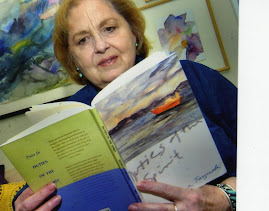Strange, this blog stuff…half-written to oneself, half-written to whomever out there might wander in, or perhaps even deliberately walk in. An odd mix that means, on one hand, I want to write as frankly and honestly as possible; on the other hand I am conscious always that there is a potential audience about whom I know little. And don’t we always revise our truths a bit when there is an audience, even a known one? Prufrock’s “face to meet the faces that I meet.”
Ah, musings only…since what I want to write about today has little to do with the above.
I was talking this morning, over coffee with a friend, about poems that respond to the poems of other poets. Like Elizabeth Bishop’s “Armadillo” and Robert Lowell’s “Skunk Hour” for instance. I love the idea of this kind of conversation between poets or poems. In fact, often when I’m stuck in my own work, I go, for help, to the poems of others. Here are a few of the ways they’ve helped:
• I read poetry often before I sit down to write it….usually one poet at a time, whose rhythms, style, subjects, I know, from experience, may have the ability to enter my body and put me in that strange semi-alert state that poetry sometimes comes from. For me, this usually means lyric or meditative poems. A few of my favorite poets for such “inspiration reading” are Louise Gluck, Ralph Angel, Linda Gregg, Yannis Ritsos, Antonio Machado, Charles Wright. But often a new book of poetry by a poet new to me will also serve.
• I enjoy writing poems that incorporate a line or so of another poet’s poem:
For example, I have a poem in my new (soon) book, Then, Something named “Poem Beginning and Ending with Halves of a Line by Ilhan Berk.
I’ve also written poems simply either using the first line of another poem…
or ending with the last line.
And I like the Glosa (or Glose): Starting with 4 consecutive lines from another poet’s poem. Then writing 4 ten line stanzas, each one ending with one of the trigger lines (in order). And rhyming the 6th and 9th lines with the final word of the stanza.
http://www.poets.org/forum/viewtopic.php?t=18656&sid=3ea6474a83c2aad2174272e9629f9cde
When I’m stuck (which is often) and no poem will come into my head or tumble itself out onto the page, I often turn to my favorite unblocking exercises. “Shadow Poems”
are poems that are, in some way, written “off” another poet’s poem, in other words, “shadowing” it. Here are three possible methods for doing this:
1. letting your unconscious do the shadowing: This is my favorite method of the three— for this kind, it’s best to choose another poet’s poem that is mostly lyrical, meditative, or elliptical in nature (i.e. not narrative). Print out the poem at least triple-spaced so there is room to write between the lines. Without reading through the source-poet’s poem, quickly read each line and think of a line that could follow directly from it and write it in the space below that line. Continue to do this for each line throughout the whole source-poem. When you are finished retype the poem with only your own lines. Then work with your lines, adding or taking away words and making adjustments until it feels like a poem.
Hints: You are likely to end up with what feels like gibberish, but ignore this and steam ahead. You are also likely to find that you’ve been forced into some interesting
phrasing and thoughts. It helps for you to have some sort of subject (NOT the same as the source-poet’s subject) in mind at least by the time you’re halfway through the lines. Relax and let your unconscious do the work without thinking too much.
2. Shadowing by the “moves:” Study your source poem to determine the “moves” (strategies) the poet has used. Perhaps, for example, the poet begins with a time of day and a person in a room, then perhaps the person does some kind of action, then expresses a thought etc. Write a poem about another subject that follows the moves of your source-poem.
3. Shadowing by syntax: Write a poem that follows the syntactical arrangement of the source poem. (e.g. if the source poem’s first sentence is constructed as: noun, verb, adjective object, you would do likewise in your poem)
A caution: Do be careful especially with #2 &3 that your poem NOT be so close to the source poem that it seems to be a rip-off. When you are done with your first draft based on the shadow, revise and revise and revise until it is your own poem entirely.




